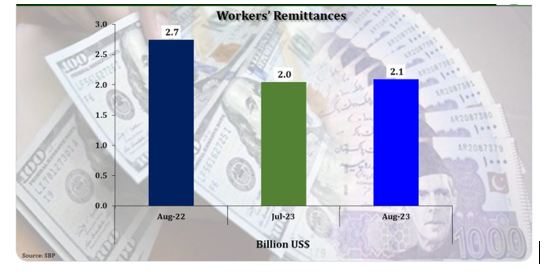INP-WealthPk
Qudsia Bano
August 2023 witnessed a significant upsurge in workers’ remittances, with an inflow of a substantial $2.1 billion. This surge not only showcases the resilience of remittances but also highlights their crucial role in supporting the economy. One of the key takeaways from this data is the impressive month-on-month growth of 3.1% in workers’ remittances during August 2023. This increase reflects the continued trust and commitment of overseas workers in sending financial support back to their families and loved ones in their home country.
Furthermore, when we consider the cumulative data for the first two months – July and August – of the ongoing fiscal year 2023-24, workers’ remittances have amounted to an impressive $4.1 billion. This two-month total indicates a strong start to the fiscal year and bodes well for Pakistan’s economic stability, according to the data available with WealthPK.

Delving into the sources of these remittances, it is evident that August 2023 saw substantial inflows from various countries. Saudi Arabia led the way with an inflow of $490.1 million, followed closely by the United Kingdom with $331.3 million. The United Arab Emirates contributed significantly with $308 million, and the United States added $262.4 million to the total remittance inflow. These countries have consistently been prominent contributors to Pakistan’s remittances, underscoring the global network of overseas Pakistani workers and their dedication to supporting their families and homeland. The robust performance of workers’ remittances in August 2023 is a testament to the unwavering commitment of overseas Pakistanis to the prosperity and well-being of their loved ones back home.
These remittances not only provide financial support but also contribute significantly to Pakistan’s foreign exchange reserves and overall economic stability. The government and financial institutions must continue to facilitate and incentivise this vital lifeline to ensure its sustained growth and positive impact on the nation’s economy. Dr Ahmed Faraz, an economist with the Pakistan Institute of Development Economics, told WealthPK that workers’ remittances had historically played a pivotal role in stabilising Pakistan’s economy, and the recent data for August 2023 was indeed promising. “The 3.1% month-on-month growth is a clear indicator of the resilience of remittances, even in the face of global economic uncertainties.”
He said the diverse sources of these remittances, with Saudi Arabia, the United Kingdom, the United Arab Emirates, and the United States as significant contributors, demonstrated the widespread reach of the Pakistani diaspora. “This diaspora not only forms a crucial part of the labour force in these countries but also constitutes a robust financial network that supports families and communities back in Pakistan.” Faraz said, however, that it was essential to recognise that the sustainability of this growth was contingent on various factors, including economic conditions in host countries, policies that facilitated remittance flows, and the overall well-being of overseas Pakistani workers.
“Governments and financial institutions should continue to promote policies that encourage remittances, reduce transfer costs, and invest in financial literacy programmes for both senders and recipients.” Moreover, he said diversifying the use of remittances beyond consumption towards productive investments could enhance their impact on long-term economic development. “It is also crucial to ensure that these funds are channelled into sectors that generate employment and contribute to economic growth, ultimately leading to a more resilient and prosperous Pakistan,” Faraz stressed.
Credit: INP-WealthPk













